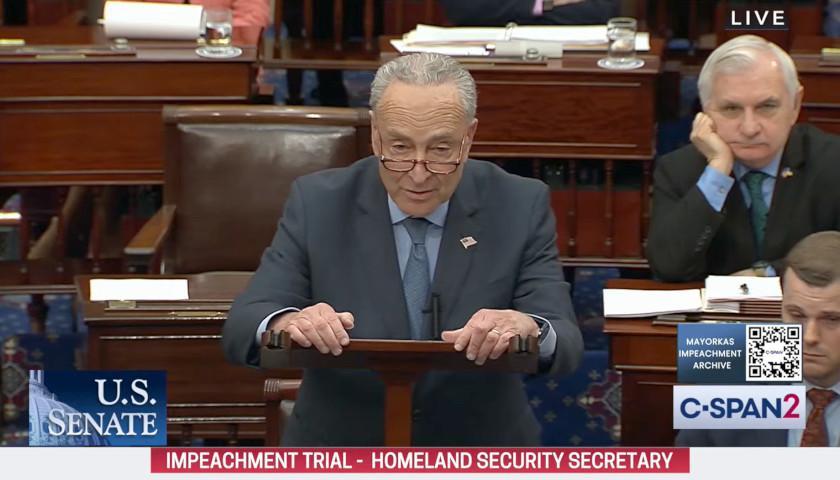Live from Music Row Monday morning on The Tennessee Star Report with Michael Patrick Leahy – broadcast on Nashville’s Talk Radio 98.3 and 1510 WLAC weekdays from 5:00 a.m. to 8:00 a.m. – host Leahy welcomed the original all-star panelist Crom Carmichael to the studio to outline election fraud and why it’s the Republicans’ duty to prevent future instances by legislating severe penalties to offenders.
Leahy: We are joined in studio by our good friend the original all-star panelists Crom Carmichael. Crom, in the last segment you said that if we want to restore or confidence in free and fair elections the very first step is that laws must be passed that insure against fraud. I agree with that.
Carmichael: And that includes penalties for those who commit fraud or who break the law. So the key is how the law is written. And to do it according to the Constitution. So we were talking about, let’s use Georgia as an example. The legislature in Georgia is controlled by the Republicans in the House and the Senate. What law should the Republican legislature in Georgia write?
Carmichael: What should the elements of the law include?
Leahy: Now here’s where there’s a curveball. There is a law about signature verification and it’s very clear what that process is in signature verification. It says basically that first absentee ballot applications must follow a verification process and they must be compared against existing voter registration signatures. That’s step number one.
Carmichael: Okay, and where are they?
Leahy: Well, that’s the problem.
Carmichael: Now were they?
Leahy: I don’t think so.
Carmichael: Okay. Well, either they were or they weren’t. But either they were or they weren’t. And if they weren’t then the people who did not do it should be held accountable. So in other words you should be able to see this as it is happening. This should not be something that’s done after the fact because you can’t solve for that. You can’t fix that problem if you let all of the different things happen and then you say okay, let’s fix it now after the envelopes have been separated so that all you have is ballots and you have no way of knowing if that ballot is valid.
Leahy: Well, we’re going to get into the weeds on this.
Carmichael: And that is what happened in Georgia.
Leahy: Well, let me make one point which I’ve noticed with state legislatures and laws passed everywhere. The state legislature will pass a law and they will think that because they’ve passed this law, I’ll give you an example.
Carmichael: No, no. What I’m saying is we agree. We agree that what the Secretary of State did in Georgia was extra-legal. We agree with that. I think that. We agree that the Secretary of State had no authority to enter into a consent decree.
Leahy: That is correct.
Carmichael: Okay, we agree with that. The Republican legislature needs to specifically take away from anyone in the government of Georgia the authority to change the law. And if they try to change it there should be criminal penalties for that person.
Leahy: Well, that’s a good point. But here’s what I’ve noticed though is about just in general.
Carmichael: No, no, let’s stick with, Georgia. Let’s fix that problem. Let’s fix that because if you can’t fix that Michael we’re not gonna fix anything. So how do we fix Georgia? You and I agreed that the Secretary of State allowed absentee ballot requests to come in and be sent out without them checking because there were so many of them. And their excuse was there were so many of them that we can’t check them all.
Leahy: Well, actually let’s talk about how this works. This is where the Democrats are so very focused on details and the Republicans have not been. But let’s take a look at that particular issue. Supposedly there are two steps in the process. The absentee ballot application comes in with the signature, which should be checked.
Carmichael: Against what?
Leahy: Against the voter registration card.
Carmichael: Right.
Leahy: That’s step one.
Carmichael: That’s step one. That didn’t happen though.
Leahy: The reason that didn’t happen as far as we can tell is that there has been no audit as to whether or not that happened. But we do know that in Fulton County which had you know 100s of 1,000s of applications for vote-by-mail to come in they only rejected eight of the applications. Only eight of them. So like a minimum.
Carmichael: What we ought to be able to determine just by asking people. Tell me what the process was that you followed? And what you and I are saying is it is highly likely that if an absentee ballot was requested that it was sent out without…
Leahy: Automatically without checking.
Carmichael: Automatically. So that should be a criminal offense.
Leahy: I don’t disagree.
Carmichael: So what I’m saying is if and everybody who is in that proof then part of that process needs to go through training. And this needs to be part of the legislation so that nobody can claim. Oh, I was too busy only just fell through the cracks. Now if you’re going to accept the responsibility and if you’re going to get paid to do your job, then you do it according to the process. And if you need to have two people one from each party look at that and verify it before it goes out, if the legislature wants to include that and then they sign someplace that shows that each party signed the absentee ballot. I don’t care if you make it cumbersome. I don’t care. I want honest elections.
Leahy: Absolutely. The element where the state legislators in Georgia fell down on this is that they didn’t put that penalty in the law and they didn’t fully fund the extensive process because they had no reason to anticipate it when they passed the law.
Carmichael: They were in session.
Leahy: In 2019 they had no idea that this this this tsunami of absentee ballots would come in.
Carmichael: Well they know it now.
Leahy: They know it now.
Carmichael: And they are still in charge.
Leahy: They are still in charge.
Carmichael: So now they can pass legislation. And the Democrats are going to yell voter suppression.
Leahy: Absolutely.
Carmichael: And Republicans are going to say every legal vote should count. Every legal vote should count and every illegal vote should be thrown out.
Leahy: What is interesting about this and if you look at bureaucratic overreach in this case and the consent decree signed by the Georgia Secretary of State that changed the signature verification process so that you could get by and not reject an absentee ballot if the only match was a fraudulent absentee ballot application signature. Who knows how many of them are like that.
Carmichael: When they rewrite the law we have what they should do. And I’m answering your original question. What can we do? Is there anything that we can do so that everyone believes that the elections are fair?
Leahy: Here’s the thing.
Carmichael: And the answer is it has to be done legally. And we have a legal way to do it. Now it’s up to the elected representatives who are legally given the authority. It doesn’t mean they have to exercise it. They can still screw up.
Leahy: The other part about this that is interesting when you talk about law, I’ll give another example where there’s a breakdown here. So in Georgia, there’s a law that false registration is a felony. this whole tourist registration thing. There’s a law on the books. And so the governor can say well that’s not going to happen because there’s it would be a felony if you did this. The only problem with that is you look at the enforcement of that law crime in 10 years only one person in all of Georgia has been charged and convicted of false registration.
Carmichael: And then here’s how to fix that. Continue that that’s the law and impose a fine of $50,000. No jail time. $50,000. And the law says that the collection of that money will be that private companies will be allowed to go after the people who committed fraud and they’ll be able to examine the records and go after the people who do that on behalf of the state.
Leahy: The law in Georgia says if you are convicted of the felony of false registration, you can be put in jail for up to 10 years and pay a fine of up to $100,000. The one person in Georgia who was convicted of false registration got probation and had to pay a fine of $6,000.
Carmichael: Well, I’m answering your question. If I can steal $10,000. and the law, the actual effect of that is that I have to return a thousand of it and that that’s how the law is adjudicated, that’s how it’s actually handled then they’re going to be a lot of people stealing $10,000. and returning $1,000.
Leahy: I think you’re exactly right.
Carmichael: So if you’re going to have fair elections we now know you have to have severe penalties.
Leahy: And the point that you’re making is Republicans need to focus like a laser beam on this going forward in every state. And we’ll see if they will.
Carmichael: Yeah, either that or they need to create their own boxes of ballots and that would then force the issue. (Leahy laughs)
Listen to the full third hour here:
– – –
Tune in weekdays from 5:00 – 8:00 a.m. to the Tennessee Star Report with Michael Patrick Leahy on Talk Radio 98.3 FM WLAC 1510. Listen online at iHeart Radio.








